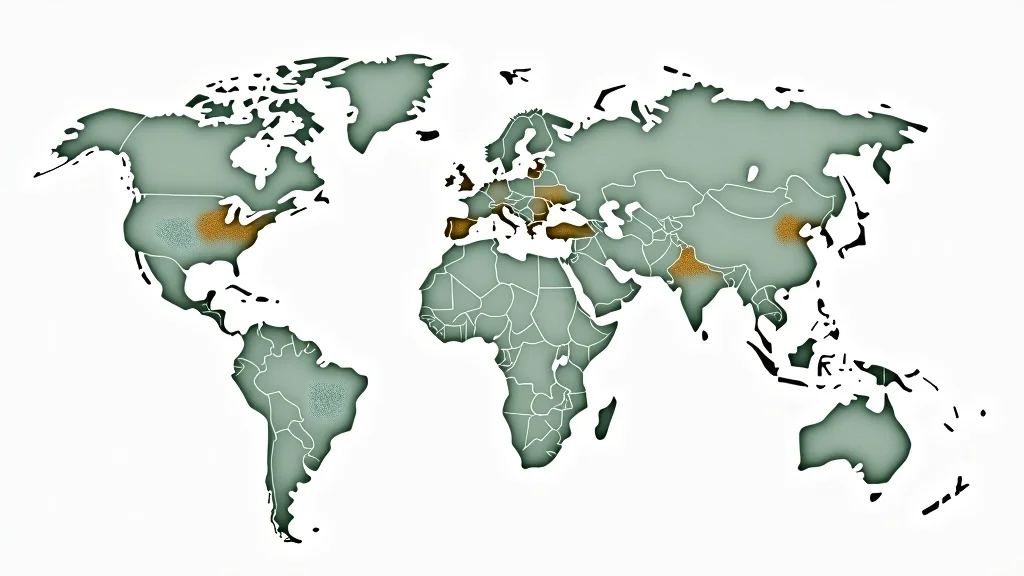Startling Fact: Despite bearing less than 5% of the global AI infrastructure, African voices hold a transformative power to redefine ethical AI governance — a narrative pivot that may shape how artificial intelligence serves humanity for decades to come.
In a world where Artificial Intelligence races ahead, ethical AI is both a contested concept and a vital necessity. The notion of what constitutes “Africa ethical AI” remains fluid, yet it is within this fluidity lies a historic opportunity for African leaders, thinkers, and communities. This article unpacks the evolving landscape of AI governance globally and zooms into Africa’s distinctive role in framing new, community-rooted ethical AI models. By engaging with the complexities of culture, context, and ethical dilemmas, Africa may emerge as a pioneering continent in the responsible deployment of AI technologies.
Startling Realities: The Current Landscape of AI Governance and Ethical AI
The Lack of Global Consensus on Ethical AI and Its Implications
AI governance today is still very much a work in progress, characterized by the absence of a unified global definition of ethical AI. As the Editorial Team at AI NEXUS AFRICA NEWS insightfully observes, “There is no universal definition, no global consensus, no shared moral compass.” This ambiguity means that currently, different regions and cultures are crafting their own versions of what responsible AI should embody. The consequence of this fragmented ethical landscape is profound: who controls the narrative around ethical AI effectively controls how future AI systems will impact societies worldwide.
This means the ethical frameworks that emerge implicitly determine global power dynamics. Countries and regions that dominate discourse today — mostly Western capitals — influence regulatory standards, technological norms, and investment priorities. For Africa, this raises essential questions about autonomy and representation. How can African nations ensure that their unique ethical considerations around AI are not overshadowed by dominant global voices? The implications are clear: without active participation, the continent risks becoming a passive consumer rather than a co-creator of AI ethics.
The Gap Between AI Principles and Local Realities
While lofty principles around transparency, fairness, and accountability abound in international AI governance circles, they often fall short when applied to local African settings. The Editorial Team AI Africa News highlights a critical fissure: “The current reality is a gap between principles and practice, between global frameworks and local realities, between those who build AI and those who must live with its consequences.”
Many parts of Africa grapple with multifaceted challenges — rural communities with limited infrastructure, informal economies, multilingual populations, and regions vulnerable to climate change. Ethical AI frameworks designed elsewhere might not account for these nuances, rendering some principles ineffective or even harmful. For example, data privacy norms built for urban, high-infrastructure environments may not translate seamlessly in rural areas where data practices and social contracts differ significantly.
This gap underscores an urgent need: ethical AI must be contextually grounded, responsive to the lived experiences of African communities rather than imported wholesale from global north paradigms. Only through such locally attuned models can AI foster trust, inclusion, and meaningful societal benefit. For those interested in how emerging technologies can be tailored to unique realities, exploring the ways future technologies could rewrite our world offers valuable perspective on the intersection of innovation and local context. Discover how future technologies are being explored to reshape reality and what this means for ethical AI in Africa.

The Role of Africa in AI Governance and Ethical AI Development
Africa’s Unique Position to Influence AI Ethics and Responsible AI
Africa stands at a crossroads with a unique opportunity to steer global AI ethics toward models reflecting diversity, care, and community engagement. The continent’s diverse cultures, languages, and social systems provide a rich tapestry from which to craft AI principles grounded in real human values. The Editorial Team of AI NEXUS AFRICA NEWS emphatically notes, “Ethical AI is not a fixed destination. It is a conversation, a negotiation, a narrative we are still writing.” For African nations, this is a call to action to become active narrators in this global conversation.
The emerging AI ecosystems in African countries are not mere technological openings but also political and ethical arenas. By leveraging pan-African initiatives, regional partnerships like the African Union, and vibrant tech hubs in cities like Nairobi, Lagos, and Johannesburg, Africa can pioneer governance frameworks that balance innovation with social justice. This ensures that AI technologies serve Africans’ needs while respecting their values and realities.
How AI in Africa Can Reflect Context, Community, and Care
Beyond theoretical frameworks, Africa’s ethical AI vision must be deeply embedded in community-centered values and the continent’s diverse contexts. This approach stands in contrast to some global models that prioritize impersonal, purely technical solutions. African AI ethics emphasizes relationality — how technology impacts not only individuals but entire communities and ecosystems.
This means co-creating AI languages, tools, and policies with locals, stressing inclusivity, respect for indigenous knowledge, and sensitivity to environmental sustainability. It also involves acknowledging historical exclusions from tech governance and investing in capacity building and representation for traditionally overlooked groups. Through this, AI becomes not an alien imposition, but a collaborative, caring technology that aligns with Africa’s aspirations.

Key Pillars of Ethical AI and AI Governance Relevant to Africa
Understanding AI Ethics: Principles and Practices
AI ethics, fundamentally, is a guide to how AI systems should be designed, deployed, and controlled to promote human wellbeing, fairness, and transparency. The core principles — often cited globally — include fairness, accountability, transparency, and privacy. Yet, Africa-centric ethical AI adds important nuances, emphasizing community welfare, cultural sensitivity, and environmental stewardship.
Practices in Africa must adapt these principles to its multilingual, multi-ethnic realities and socio-economic complexities. For instance, “fairness” entails addressing algorithmic bias not just in technical terms, but also reflecting on historical inequities and systemic injustices prevalent in African societies. “Transparency” must consider language barriers and accessibility, ensuring AI systems are explainable to diverse populations.
National AI Policies and Governance Models in African Countries
Several African nations have started proactively formulating national AI strategies that incorporate ethical frameworks tailored to their unique contexts. For example, South Africa and Kenya have introduced detailed AI policies aimed at balancing innovation with safeguarding human rights. These national governance models often emphasize multi-stakeholder participation involving governments, academia, civil society, and private sectors.
Such policies highlight the importance of building local AI talent, investing in data infrastructure, and ensuring regulatory oversight supports responsible AI growth. Despite varying stages of development, these countries share a commitment to embedding ethics as a foundational pillar in AI development and deployment.
| Aspect | Global AI Governance Frameworks | African AI Governance Approaches |
|---|---|---|
| Scope | Broad, often Western-centric, shaped by few global capitals | Contextual, community-focused, sensitive to local socio-economic challenges |
| Ethical Focus | Fairness, transparency, accountability, privacy | Fairness with cultural nuance, environmental care, inclusivity, and social justice |
| Regulation | Formal regulations, standards, and international cooperation | Combination of formal policy and community-driven governance models |
| Engagement | Predominantly expert-driven with limited grassroots involvement | Emphasis on multi-stakeholder participation including marginalized groups |
| Infrastructure | Highly developed AI ecosystems and data availability | Emerging infrastructure; focus on capacity building and equitable technology access |

Expert Insights: Perspectives from African AI Leaders on Ethical AI
“Ethical AI is not a fixed destination. It is a conversation, a negotiation, a narrative we are still writing. Those who have the courage to speak now will influence how the world uses AI for decades to come.” – Editorial Team AI Africa News, of AI NEXUS AFRICA NEWS
Challenges and Opportunities in AI Development Across Africa
African AI leaders recognize the dual-edged nature of AI development: the challenge of bridging infrastructure gaps and the opportunity to leapfrog traditional development paths via ethical AI innovation. There are hurdles, such as limited data infrastructure, digital literacy, and resource disparities. Yet, these challenges fuel innovative problem-solving that blends old wisdom with new technologies — creating AI tailored to Africa’s realities.
AI researchers and practitioners in Africa are increasingly focusing on areas like agriculture, health, and climate resilience, where ethical AI can have direct social impact. They emphasize local data sovereignty, robust community engagement, and ethical frameworks that do not merely adapt Western models but originate from African experiences.

Common Misconceptions and Challenges in Implementing Responsible AI in Africa
Bridging the Gap Between Global Frameworks and Local Needs
One common misconception is that global AI frameworks are universally applicable without modification. Africa’s diverse linguistic, cultural, and socio-economic contexts necessitate adaptation and sometimes fundamental rethinking of these models. Bridging this gap means integrating local knowledge systems, addressing infrastructural constraints, and crafting policies that speak directly to on-the-ground realities.
Another challenge lies in balancing regulation and innovation. Too rigid an AI policy may hinder technological progress, while too lax an approach risks ethical lapses and harm. African policymakers must navigate this tension carefully, seeking models that are pragmatic, inclusive, and forward-looking.
Addressing Ethical AI in Multilingual and Climate-Vulnerable Regions
Africa’s multilingual environments add complexity to AI ethics, as AI systems need to serve populations speaking hundreds of languages and dialects. Ensuring equitable AI access and understanding requires language-sensitive design and education initiatives. Moreover, many African regions face acute climate vulnerabilities that AI solutions should address responsibly—avoiding harm and promoting sustainability.
Ethical AI for Africa, therefore, involves intersecting considerations: how to honor linguistic diversity, protect vulnerable communities, and align AI applications with environmental imperatives. This holistic approach distinguishes Africa ethical AI from mainstream narratives.

Actionable Strategies for Advancing Africa Ethical AI
Co-Creating AI Languages, Tools, and Values with Communities
One promising strategy is the collaborative creation of AI tools that incorporate local languages, practices, and values. By engaging communities directly in the design and deployment of AI, African AI developers ensure ethical frameworks reflect lived realities and challenge dominant technological paradigms. This participatory model fosters empowerment, digital inclusion, and ethical accountability.
Such co-creation also involves education, enabling people from various backgrounds to understand and contribute to AI governance, turning users into co-authors of ethical AI futures.
Building Inclusive AI Governance That Reflects African Realities
Inclusive governance is central to Africa ethical AI. This means policies must be shaped through multi-sector dialogues involving governments, civil society, academia, and private sector entities. Governance models should be flexible to local conditions yet robust enough to prevent misuse and ensure ethical standards are enforced.
Investment in local AI talent, infrastructure, and research institutions is equally vital to sustain an ethical AI ecosystem guided by African voices and priorities. Ultimately, building inclusive AI governance promises technology that serves as a catalyst for equitable development.

People Also Ask: Addressing Common Questions on Africa Ethical AI
Which African country is leading in AI?
South Africa is often recognized as a leader in AI development in Africa due to its advanced tech infrastructure, active research institutions, and progressive AI policies. Countries like Kenya, Nigeria, and Egypt also play key roles in expanding AI capacities on the continent.
What are the 4 pillars of ethical AI?
The foundational four pillars are fairness, transparency, accountability, and privacy. In Africa, these pillars are expanded to include cultural context, inclusivity, environmental care, and community engagement.
What is the most ethical AI company?
While the designation varies by region and values emphasized, companies that prioritize responsible AI governance, transparency, and social impact – including several African startups focusing on local solutions – are leading ethically minded AI development.
What are the 7 principles of ethical AI?
Commonly recognized seven principles are: fairness, transparency, accountability, privacy, reliability, safety, and inclusiveness. African AI ethics promotes adapting these to local cultural and environmental contexts, fostering an expanded ethical vision.
Key Takeaways: The Future of Africa Ethical AI and Global Impact
- Africa’s diverse contexts position it uniquely to shape ethical AI that reflects real-world needs and values.
- Active African participation ensures global AI governance is more equitable, inclusive, and representative.
- Building infrastructure, inclusive governance, and community co-creation are vital to advancing ethical AI in Africa.
- The conversation on ethical AI is ongoing — Africa’s voice will be crucial in defining its future meaning and direction.
Conclusion: Embracing Africa’s Role in Defining Ethical AI
“Who controls the meaning of ethics controls the future of AI.” – Editorial Team AI Africa News, of AI NEXUS AFRICA NEWS
Now is the moment for African leaders, communities, and thinkers to seize the narrative, establish new ethical AI models, and ensure technology uplifts their societies sustainably and justly.
As you reflect on Africa’s pivotal role in ethical AI, consider how these discussions fit into the broader landscape of technological change. For a deeper dive into the transformative potential of emerging innovations and their impact on society, explore the comprehensive analysis of future technologies that could rewrite reality. This perspective can help you connect the dots between responsible AI governance and the next wave of advancements shaping our world, offering inspiration for those eager to stay ahead of the curve and drive positive change.
Discover More: Explore The AI Africa News Channel
- Stay updated on the latest developments in AI governance across Africa.
- Learn from expert interviews and in-depth analyses.
- Join the conversation on responsible AI shaping the continent’s future.
- Visit https://aiafricanews.com
- Subscribe to newsletters and updates
- Engage with community forums and expert panels
To deepen your understanding of ethical AI initiatives in Africa, consider exploring the following resources:
-
“Promoting Ethical AI Development Across Africa”: This article by the Society for AI Advancement discusses efforts to create an inclusive AI ecosystem that drives sustainable development while preserving cultural values and enhancing human dignity across the continent. (societyforai.org)
-
“Building Africa’s Ethical AI Future”: The Pan-Africa Center For AI Ethics outlines their mission to advance responsible, inclusive, and human-centered artificial intelligence across Africa, highlighting various projects and initiatives aimed at shaping the continent’s AI landscape. (pacfaie.org)
These resources provide valuable insights into the ongoing efforts to develop ethical AI frameworks that are culturally relevant and socially beneficial in Africa.
 Add Row
Add Row  Add
Add 




Write A Comment